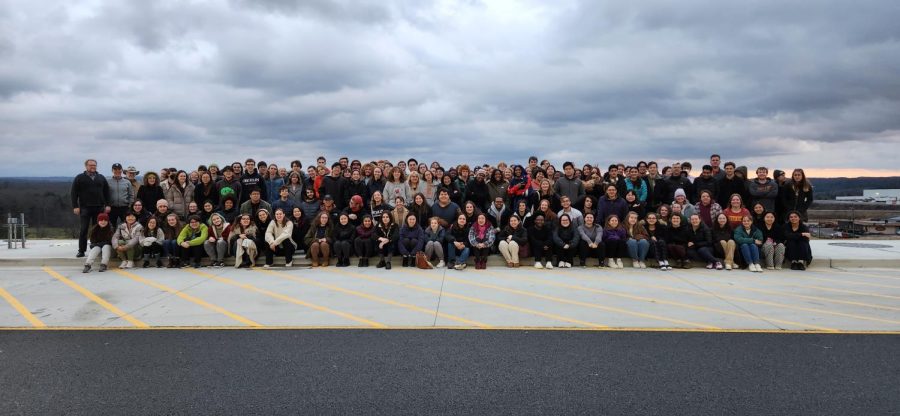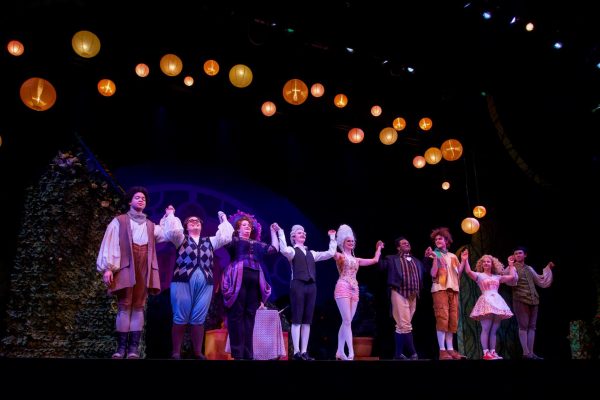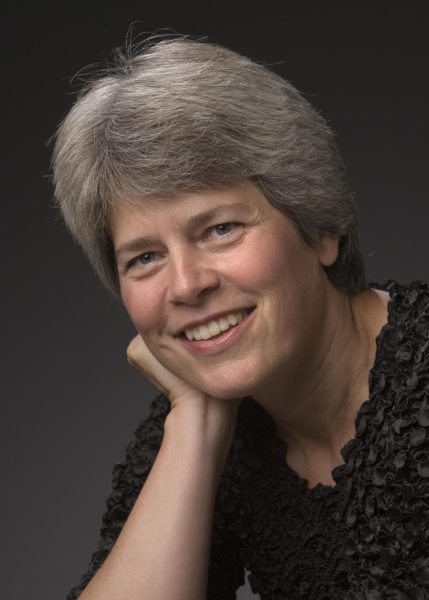Performers Reflect on United Nations Gala Concert
Students pose for a group photo at a rest stop in Pennsylvania on their way back to Oberlin from Carnegie Hall.
Zach Wuorinen, third-year Double Bass Performance major:
As a classical double bassist, there are many rites of passage that our community helps us celebrate: being accepted into a conservatory, going to summer music festivals, playing certain pieces in orchestra, and playing in venues significant to classical music are among a few of them. Oberlin’s recent concert at Carnegie Hall was overwhelming in that it delivered on three of these milestones: going on tour with an orchestra for the first time, playing a concert in Carnegie Hall, and performing Beethoven’s Symphony No. 9. Carnegie Hall’s acoustics are every bit as stunning as popular culture claims, and once the concert began, all of my anxieties melted away as the obligations and worries of “real life” were temporarily suspended. I am still astonished at the opportunity that was afforded to us by Oberlin and the United Nations and find it impossible to put my gratitude into words — to say it was a high honor would be a flagrant understatement.
Delaney Fox, second-year Vocal Performance and English major:
No one could have prepared me for the experience of performing at Carnegie Hall for the United Nations General Assembly. Not only was I taken aback by the resonance of the concert hall and by the heavenly sound that reverberated back to me, I also was overcome by an esoteric sense of humility. During the performance, it hit me: I am literally singing for the whole world, for nations I’ve never been to, for people who don’t speak my language. This realization that came as I sat on stage listening to the first movements of Beethoven’s Symphony No. 9 fueled my performance and commitment to the text. For the first time, I heard the music; I understood every word. “Ahnest du den Schöpfer, Welt?” Do you sense the creator, world? I will never forget the feeling of singing for something so much bigger than myself, for humanity.
Gracie McFalls, second-year Viola Performance major and Senior Staff Writer:
Upon entering through the Carnegie Hall stage door, one is greeted by portraits of some of the greatest musicians of all time: Rostropovich, Louis Armstrong, John Lennon. Elevators big enough to fit multiple upright basses or a grand piano line the walls, and staircases lead to a maze of dressing rooms, each one labeled for its respective performers. It’s easy to see the thrill of the space, the history of the hall. Parts of the music that had completely gone over my head in Finney Chapel stood out to me in the resonant Carnegie: a clarinet line here, a bass line there, the choir’s crisp pronunciation of “Freude.” As people walked across the opposite side of the stage in high heels, it sounded like they were right next to me. Being in Carnegie made me realize that the hall has seen so much history, and that this is a history which now includes Oberlin and the U.N. Before the concert, the president of the U.N. General Assembly spoke on how previous concerts were impacted by COVID. The speech reminded me that history and music are inescapably intertwined and left me thinking about how the appreciation of musical acoustics and artistry remains consistent even while the world around it changes.
Tia Leung, second-year Vocal Performance and Politics major:
My Carnegie performance was nothing short of incredible. It didn’t feel real — taking the subway home to see my family, and then coming back to one of the most famous performance spaces in the world to sing for some of the most important people in the world. I got a little emotional up there, too, thinking about my grandfather and his musical roots, my mother’s painful journey to this country, and how they have given me the opportunity to be here. As for An die Freude, I think it was the best thing we could have possibly performed for the U.N. It’s a classic, for one, but also I believe that it is relevant to its mission as an international organization and I sincerely hope that this is a reminder for the attendees that despite our cultural differences, the goal is for all people to come together for the greater good — alle Menschen werden Brüder. It’s an important message for us too: we must come together, despite how different we are, to make this world a better place for the children of tomorrow.
Cecily Miles, second-year Comparative Literature major:
Performing Beethoven’s Symphony No. 9 before the U.N. at Carnegie Hall was a very affirming experience. As a student in the College, I felt a deep sense of togetherness with my peers in College Choir and in the Orchestra despite our being in different programs and ensembles. We endured two long bus rides together, we explored the city together, and we performed together on the same stage in a world-class venue. The piece we performed definitely contributed to this feeling. It was exciting to be able to share that message with such a powerful audience. Given how effective I found the piece to be, I have hope that it was able to elicit a similar response among the members of the General Assembly.





